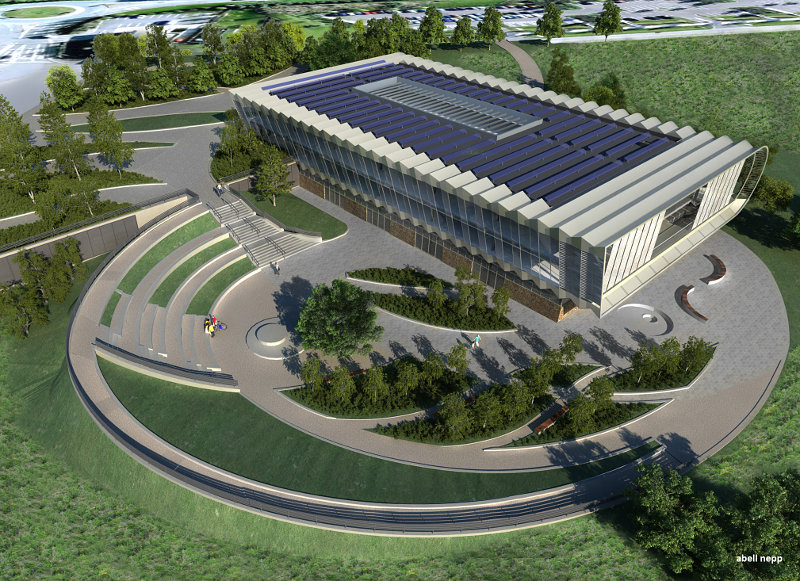New build for bioinformatics

Bioinformatics is the application of computer science to biology. The new build – and the funding that makes it possible – represents a growing awareness of the potential benefits to society that bioinformatics can bring, including better medicines, crops resistant to climatic change and the protection of biodiversity. Major support for the new build comes from the Biotechnology and Biological Sciences Research Council (BBSRC), the Medical Research Council (MRC), the Natural Environment Research Council (NERC) and the Wellcome Trust.
“Bioinformatics supports our research and translation into human healthcare, and its importance will only grow as we explore more genomes. We fulsomely welcome the development of the ELIXIR hub on campus which will complement perfectly the activities of both the Wellcome Trust Sanger Institute and EMBL-EBI.”
Professor Mike Stratton Director of the Wellcome Trust Sanger Institute
The contract for construction has been awarded to Willmott Dixon, a privately-owned capital works company based in Hertfordshire, UK that is committed to sustainable building. Energy efficiency is central to the design of the new building, which will house approximately 200 staff from EMBL-EBI and ELIXIR.
The ground breaking follows a thorough archaeological excavation project, led by Oxford Archaeology East. Findings from this dig and previous excavations on the Genome Campus will be on public display on the occasion of the ground breaking, and experts will be on hand to answer questions about the artefacts and the site’s history.
More information
Selected websites
About EMBL-EBI
The European Bioinformatics Institute (EBI) is part of the European Molecular Biology Laboratory (EMBL) and is located on the Wellcome Trust Genome Campus in Hinxton near Cambridge, UK. The EBI grew out of EMBL’s pioneering work in providing public biological databases to the research community. It hosts some of the world’s most important collections of biological data, including DNA sequences (ENA), protein sequences (UniProt), animal genomes (Ensembl), 3D structures (the Protein Databank in Europe), data from gene expression experiments (ArrayExpress), protein-protein interactions (IntAct) and pathway information (Reactome). EMBL-EBI hosts several research groups and its scientists continually develop new tools for the biocomputing community.
About EMBL
The European Molecular Biology Laboratory is a basic research institute funded by public research monies from 20 member states (Austria, Belgium, Croatia, Denmark, Finland, France, Germany, Greece, Iceland, Ireland, Israel, Italy, Luxembourg, the Netherlands, Norway, Portugal, Spain, Sweden, Switzerland and the United Kingdom) and associate member state Australia. Research at EMBL is conducted by approximately 85 independent groups covering the spectrum of molecular biology. The Laboratory has five units: the main Laboratory in Heidelberg, and outstations in Grenoble, Hamburg, Hinxton and Monterotondo (near Rome). The cornerstones of EMBL’s mission are: to perform basic research in molecular biology; to train scientists, students and visitors at all levels; to offer vital services to scientists in the member states; to develop new instruments and methods in the life sciences and to actively engage in technology transfer activities. Around 190 students are enrolled in EMBL’s International PhD programme. Additionally, the Laboratory offers a platform for dialogue with the general public through science communication activities such as lecture series, visitor programmes and the dissemination of scientific achievements.
About ELIXIR
The purpose of ELIXIR is to develop a sustainable infrastructure for biological information in Europe. Central to its success is the generation of stable funding for Europe’s most important publicly accessible databases of molecular biological information, and the development of a compute infrastructure that can cope with the data deluge. ELIXIR is one of 44 research infrastructures recommended by the European Strategy Forum for Research Infrastructures (ESFRI) as being of key strategic importance to Europe’s future. ELIXIR will provide data resources; bio-compute centres; an infrastructure for integration of biological data, software tools and services; support for other European infrastructures in biomedical and environmental research; and bioinformatics training for scientists. ELIXIR supports researchers working to meet the European Grand Challenges, including healthcare for an aging population; a sustainable food supply; competitive pharmaceutical and biotechnology industries; and protection of the environment.
The Wellcome Trust Sanger Institute
The Wellcome Trust Sanger Institute is one of the world’s leading genome centres. Through its ability to conduct research at scale, it is able to engage in bold and long-term exploratory projects that are designed to influence and empower medical science globally. Institute research findings, generated through its own research programmes and through its leading role in international consortia, are being used to develop new diagnostics and treatments for human disease.
The Wellcome Trust
The Wellcome Trust is a global charitable foundation dedicated to achieving extraordinary improvements in human and animal health. We support the brightest minds in biomedical research and the medical humanities. Our breadth of support includes public engagement, education and the application of research to improve health. We are independent of both political and commercial interests.


